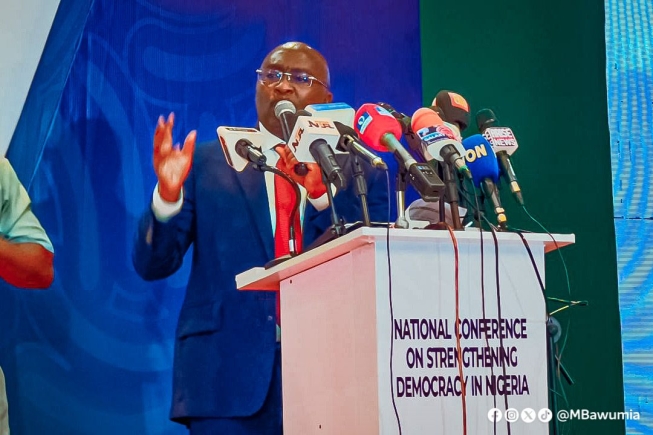
Bawumia Speaks in Nigeria: Calls for stronger institutions to strengthen democracy in Africa
Former Vice President Dr Mahamudu Bawumia has stated that ensuring a strong and thriving democracy on the African continent goes beyond voting, counting, and successfully electing a leader.
Speaking as the keynote speaker at Nigeria's National Conference on Strengthening Democracy in Nigeria this morning (January 27, 2025), Dr Bawumia said there are several other imperatives, which are "often taken for granted," but play a critical role in guaranteeing a democratic culture, "resilient enough to deliver governance, economic, and social dividends to citizens."
"The right of the citizenry to choose leaders in a free and transparent manner is sacrosanct and remains one of the most vital anchors of a true democratic dispensation. But choosing and/or changing leaders through the ballot box, though necessary, is not sufficient to guarantee a true and flourishing democratic culture," Dr Bawumia said at the forum, which also had Nigeria's Vice President, Kashim Shettima, in attendance.
"There are several other imperatives, including often-taken-for-granted issues that, when combined with peaceful and credible elections, enrich and sustain our democracy."
One of the most important determinants of a flourishing democracy, Dr Bawumia observed, is "the quality of institutions capable of guaranteeing rights" and "checking wanton abuse of power." These, he said, include independent election management bodies, the judiciary, the ombudsman, the police, other law enforcement agencies, and many others.
"I am an economist, a banker, and a politician. One of the most topical issues about growth that has been extensively discussed by development economists is the now famous institutions and geography debate. Celebrated economists like Dani Rodrik, Daron Acemoglu, and others have come to a firm conclusion that, when it comes to the determinants of growth, the quality of institutions towers above everything else."
Weakening institutions and their causes
Dr Bawumia, however, noted that while the culture of peacefully choosing leaders is being entrenched in many African countries, "these institutions are becoming weak and endangered."
The former Vice President identified several reasons contributing to the weakening of institutions and called for action to address them to build stronger democracies.
"Several reasons account for this. First, Mr Chairman, when we place partisan, ethnic, and other interests over and above competence in appointments to these institutions, we are simply creating mere edifices and structures to reward cronies, creating avenues for reluctant democrats to get a backdoor route to autocracy and misgovernance."
"Second, there is a growing phenomenon in our democracy whereby people deliberately run down these independent and accountability institutions purely on emotive reasons, especially when these institutions decide, as they should, to uphold the law in the interest of the masses and in strict fidelity to the law."
"It is rather alarming that sometimes these bastardisations of the institutions are railroaded by people with loud voices; people with professional and technical pedigrees; and people who know the truth as espoused by these institutions. For these people, partisan and sectional interests are often packaged as technical and professional opinions, thereby setting these institutions up for public ridicule, scorn, and disdain."
"This has often set the stage for people with no appreciation of the issues at stake to run amok, eroding public confidence in these institutions and causing substantial damage to our democracy."
Dr Bawumia was firm in his belief that, for democracy to be wholly strengthened, all these issues that inhibit the strengthening and growth of democratic institutions must be nipped in the bud.
Other speakers at the forum included Nigerian Vice President Kashim Shettima and former Nigerian leader General Abdulsalami Abubakar.
